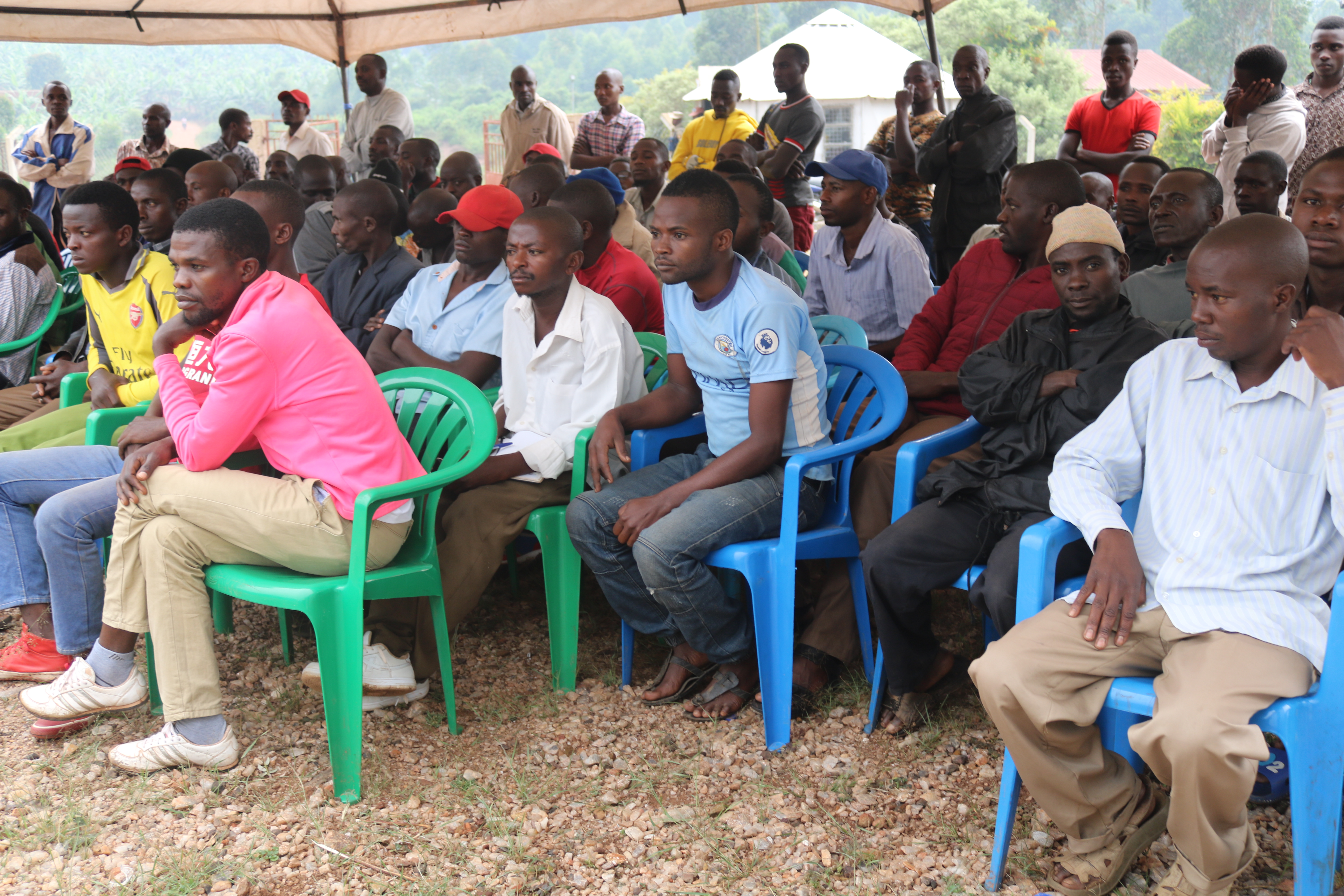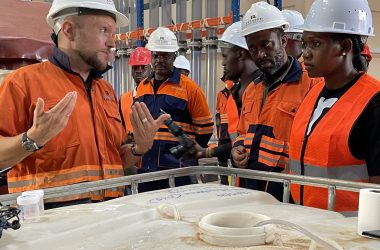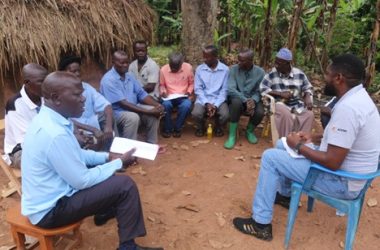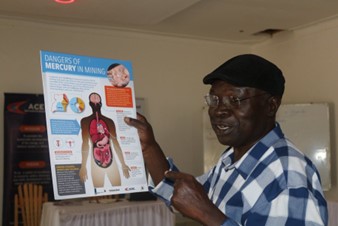The company is said to have settled its debt with them eventually, but that did not stop the disgruntled ASMs.
Over one thousand disgruntled miners take their seats in a tent, to convene in a meeting organised by one of the regional representatives of the Uganda Association for Artisanal and Small scale Miners (UGAASM) – an ASM association with representation from all mining regions. The meeting has been called to resolve long-standing issues between members of the Mwerasandu Miner’s Association and Zarnack Holdings, the company on whose mining lease they are working. The company acquired its license in 2011, and it will run for twenty years-up to 2031.
In 2016, Zarnack Holdings entered an MOU with the artisanal miners in Mwerasandu to mine tin on its lease but exclusively sell it to the company.
The Mwerasandu tin mines, an expansive maze of deep tunnels left behind by colonial miners four decades ago, are located 27 km from Ntungamo town, less than 20 Km from the Uganda-Rwanda border crossing of Mirama Hills. Tin mining in this area has been going on since 1926 and reached its peak in the sixties and seventies, favoured by good global prices. However, the foreign company abandoned the mines in the late seventies mainly due to the political insecurity in the country and the locals took over. The local artisanal miners remained in control of the mines until 2011 when Zarnack acquired the mining lease.
However, the company did not commence any serious mining operations nor make any significant investment in the tunnels it found there at the time, preferring instead to enter an arrangement with the artisanal miners to buy all the tin they dug up. This arrangement is in place up to date. Although the miners repeatedly accused Zarnack of offering them low prices over time, they did not have many options given the restrictive export market of tin in the Great Lakes Region due to its designation as a ‘conflict mineral.’
The relationship between the miners and the company severely deteriorated in late 2019, when the company started to gradually slash the tin prices eventually to more than half what they had been offering the miners.
According to Nabassa Jessica, the original price per Kilogram was twenty thousand shillings, then it was reduced to fifteen thousand in October, cut further to ten thousand shillings in November and eventually seven thousand in January. “On top of this, they were not paying us on time,” added Jessica. “You would take your kilogram of tin and have to write in a book so they can pay you later.”
The price reduction angered the miners. However, according to Jessica, what ultimately sparked off the strike was the failure by the company to pay 4.6 million shillings worth of tin ore to ten miners over two months after the miners had delivered it. The miners supplied the tin to the company in December last year when the price was ten thousand shillings a kilogram and they were not paid until January. Worse still, the company wanted to pay them at the January price which meant they would incur a loss of three thousand shillings for every kilo. “We told them to either give us our tin, or the money,” recounts Jessica.
According to the Manager of Zarnarck Holdings, Moses Sserunjoji, the company’s woes started with a directive from the Uganda Revenue Authority (URA) to stop all exports of unprocessed mineral ores. A New Vision report indicates that Dickson Kateshumbwa, URA’s Commissioner for Customs, in a letter dated 12th February 2019, directed all staff to block any exports of unprocessed mineral ores through any customs point.
This ban had a direct effect on Zarnarck, which, according to Mr. Sserunjonji, was processing an export permit to sell their tin to clients internationally. He further narrates that the company had not been making sales ever since the ban since their local clients who export to other countries after buying from the company could no longer do so and stopped buying the tin all together. “We had over 800 workers before, now they are less than 400. Production has gone down and we no longer even have the money to keep buying ore from miners,” He said.
But the miners would hear none of that. They demanded that their money is paid irrespective of whatever challenges the company was going through. Birakwatira Daburensio, a 64 year old miner argues that miners have the right to get their money instantly because of the hard work and effort invested during extraction. “We work so hard and risk our lives daily to put food on the table, why should they not pay us? It is unfair.”
Dying for tin
Indeed, the miners literally risk their lives to extract tin from the belly of the treacherous Mwerasandu hills, that have claimed possibly hundreds of lives in accidents over the decades. Forty-year old Kyomukama Regina, describes the horrors encountered in the tunnels on a daily basis. “You enter the tunnels knowing you may or may not come out alive,” she says. “One would think working down there (underground) is risky for women considering they are prone to acts of sexual violence, but there is no time for that. Everyone is trying to get as much as they can and stay alive while at it. Because you can be buried by soil anytime.” When probed to reveal how many miners had died working in the mines, she pensively points at a far off hill while recalling the two most recent deaths that had occurred. “We buried two people from there just last week. So, I cannot put a number to it. The deaths are too many.”
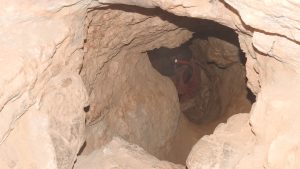 “You enter in the morning after breakfast, and next see the light of day in the evening,” adds Regina. She narrates that the work is tedious, even without the hunger crawling in as the day progresses. And yet, one has to muster the strength to drag the ore out of the tunnel at the end of the shift. “This is why we are so bitter. When a kilogram was still at twenty thousand shillings, we would share and get a reasonable amount of money each, but at seven thousand shillings, each miner walks away with only about three hundred shillings.”
“You enter in the morning after breakfast, and next see the light of day in the evening,” adds Regina. She narrates that the work is tedious, even without the hunger crawling in as the day progresses. And yet, one has to muster the strength to drag the ore out of the tunnel at the end of the shift. “This is why we are so bitter. When a kilogram was still at twenty thousand shillings, we would share and get a reasonable amount of money each, but at seven thousand shillings, each miner walks away with only about three hundred shillings.”
On some days, narrates Birakwate Daburensio, the miners do not only carry ore out of the deep tunnels, but dead bodies of their “unfortunate” colleagues as well. He reports that the company caters for burial arrangements for workers that meet their death in mines but does not offer any other form of support to the deceased’s family. “This meeting should bring us answers on why people’s families are not helped when they die. Most men here have families who entirely depend on them. When they die, the company should at least lend a helping hand to the family.”
The subcounty chief for Ruhama recalls an incident in the recent past, where a mine fell on one of the workers, who got injured and required medication. However, according to the sub county chief, the Zarnack Holdings manager tried to avoid paying for his medical bills, claiming the company was not responsible for the ASMs as their only role was to buy tin from them. “It was until the RDC got involved, that the manager took action, and footed this man’s medical bills.”
According to Daburensio, the company gave the miners protective gear in 2018 but it is now worn out and useless. However, he notes that it is not possible to go into the mines with gum boots because they are slippery and make navigation through the tunnels difficult. “We prefer going into the tunnels light because of the heat.”
Zarnack Holdings has for long had issues of compliance. According to Moses Sserunjoji, the owner, a one Joachim Zarnack of German origin, abandoned the business due to issues with the Ministry of Energy and Mineral Development. “Since then, we are just trying to keep the company alive by employing ASMs and buying tin from them. We have been able to sell locally but it brings a few returns. This is why we hope to sell outside Uganda after the ban has been lifted.

